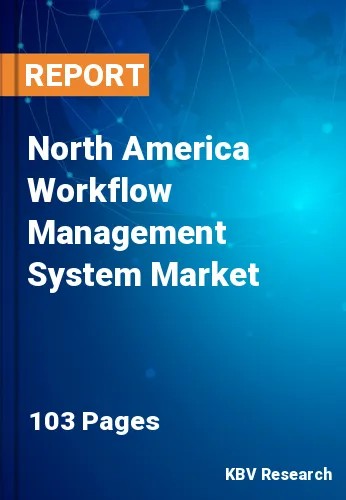The North America Workflow Management System Market would witness market growth of 31.4% CAGR during the forecast period (2022-2028).
Many people working with customers, employees, patients, constituents, or suppliers must input or retrieve data from several systems to do their duties. These systems are often built or developed by other companies; therefore, attempts to link them through APIs or integration middleware have failed. As a result, they simply won't communicate. As a result, RPA solutions have become a popular approach to swiftly and affordably automate operations like data input and extraction across many systems.
This artificial intelligence (AI) process automation system can handle large amounts of data from structured and unstructured sources in multiple forms and languages. Then, the machine learning algorithms may monitor the information, data, and systems and alert users to any unusual activity.
These machine-learning-based systems can spot disparate data from many sources, fill in data gaps using other methods, and confirm that the data is appropriate for the job. In addition, these AI-enabled bots work with human agents to prevent the spread of data errors or missing information across the company.
The growth of IoT is being fueled in large part by new applications and business models as well as lower device prices. The result is that there are also more linked gadgets (connected cars, meters, machines, wearable, and consumer electronics).
A new generation of process automation was brought about by the industrial sector's rapid adoption of Industry 4.0 rules. Workflow automation is rapidly taking the role of conventional SOPs. Practically everything ranging from sensors and machines in industrial settings to vehicles and kitchen devices is increasingly being linked to networks, spurred by the rising acceptance of mobility and BYOD rules.
By evaluating system-level data, IoT connection is starting to fuel a new level of intelligence for buildings. It is widely utilized by businesses that provide fault detection and diagnostics as well as energy services. However, many sophisticated systems in bigger institutional buildings have more difficult difficulties than many AI algorithms with access to building data can handle. As a result, the need for workflow management systems in North America is being driven by the growing usage of workflow automation software across sectors.
The US market dominated the North America Workflow Management System Market by Country in 2021, and would continue to be a dominant market till 2028; thereby, achieving a market value of $12,844.6 million by 2028. The Canada market is experiencing a CAGR of 34.4% during (2022 - 2028). Additionally, The Mexico market would exhibit a CAGR of 33.2% during (2022 - 2028).
Based on Component, the market is segmented into Software and Services. Based on Software Type, the market is segmented into Production Workflow Systems, Web-based Workflow Systems, Messaging-based Workflow Systems, Suite-based Workflow Systems and Others. Based on Deployment Mode, the market is segmented into Cloud and On-premises. Based on Vertical, the market is segmented into BFSI, Telecom & IT, Retail, Healthcare, Travel & Hospitality, Transportation and Others. Based on countries, the market is segmented into U.S., Mexico, Canada, and Rest of North America.
Free Valuable Insights: The Global Workflow Management System Market is Estimated to reach $53.5 Billion by 2028, at a CAGR of 33.1%
The market research report covers the analysis of key stake holders of the market. Key companies profiled in the report include IBM Corporation, Oracle Corporation, Newgen Software Technologies Limited, Xerox Corporation, Appian Corporation, Nintex Global Ltd. (TPG Inc.), Software AG, Pegasystems Inc., Bizagi Group Limited, and Source Code Technologies LLC.
By Component
By Deployment Mode
By Vertical
By Country
Our team of dedicated experts can provide you with attractive expansion opportunities for your business.

